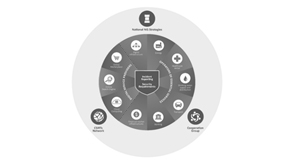Business
Continuity
management
What is business continuity management?
Business continuity management is the entire range of interventions (policies, procedures, processes, technical interventions) to secure the delivery of your most important services and products to all your customers.
The aim is to prevent interruptions in your supply and production processes and to restore them as quickly as possible in the case of an unforeseen calamity. All this to minimise the damage to your organisation and your customers.
Which precautions are relevant for your organisation depends on various factors such as the type of organisation, the market in which your organisation operates, the contractual obligations you have entered into, applicable laws and regulations and the risks your organisation wishes to take and/or avoid.
Objectives of
Business Continuity Management
- Ensuring delivery of services and products to your customers, as well as the products and services your organisation depends on.
- Prevention of interruptions in production and delivery processes
- Being able to quickly detect continuity incidents
- Responding effectively to emergencies so you are back in business as soon as possible
- Learning from mistakes
-Increase your resilience-
Why is business continuity management important for your organisation?
We are increasingly moving towards an “always on” society in which services and products must be ordered and delivered 24 hours a day. By outsourcing business activities, companies become increasingly dependent on each other and the weakest link determines the strength of the entire supply chain.
As a result, companies and customers are making increasingly higher demands on the reliability of the delivery of products and services. In case of critical services, the government also demands measures to guarantee service provision, even in times of major calamities.
It is therefore important for your organisation to be aware of the risks which could endanger the continuity of your organisation.
By implementing and maintaining an adequate business continuity strategy, you increase your organisation’s resilience and prevent calamities from endangering your organisation’s existence.
Do you know which products and services are crucial for your customers? Do you know which services and products are most important for the survival of your organisation?
Are you familiar with the requirements your customers, buyers, insurers and government set for securing your services? Do you know which suppliers your organisation depends on heavily and whether and how these parties have secured their services? Are you familiar with the risks which may affect your organisation and the delivery of your services and products?
Benefits of a good continuity management policy for your organisation
Customer loyalty – Existing customers notice you take measures to prevent interruptions, to recover quickly and also learn from incidents and calamities. As a result, they consider your organisation to be a reliable partner with whom they would like to continue doing business.
Successfully obtaining new orders – Due to chain dependency, parties set high demands on the continuity they want to do business with.
Therefore, before a third party enters into a new partnership with your organisation, this party wants to know in advance how your organisation regulates the continuity of services to third parties.
If this does not meet expectations, your organisation may not qualify for the new assignment and you may miss out on potential revenues.
In geval van calamiteit
A catastrophic event, such as a product fault, damage to the environment, ransomware or fire in part of your company, can have far-reaching consequences for the continued existence of your organisation

Effective use of your assets – A solid business continuity strategy is based on the risks which truly affect your organisation. By focusing on these risks, you invest in the right measures, avoid unnecessary costs and increase the effectiveness of your organisation. Recognising and seizing opportunities with a firm understanding of and control over the risks involved. This is called effective entrepreneurship!
Preventing unnecessary damage – By aligning your continuity measures with existing contractual agreements with partners, customers and relevant laws and regulations, you comply with all your chain obligations.
This prevents unnecessary damage to your image, your brand and any possible fines or legal disputes.
Competitive advantage – All the above benefits help to strengthen your strategic position.
By obtaining an ISO 22301 certificate, testing your contingency plans and/or having an (internal) audit carried out, you demonstrate the validity of your continuity strategy. See also: What we can do for you.
Ensuring the continuity of your services and products.
Even when things go seriously wrong!
-Know the resilience of your own organisation-
Important aspects when implementing an information security strategy
When developing and implementing your business continuity strategy, you should consider the following aspects:
Aan welke eisen moet u voldoen?
Know what requirements your organisation must meet with regard to business continuity! Which legislation and regulations and contractual obligations apply to your organisation regarding continuity management. How do these requirements translate to measures in the area of human resources, processes and technology?
Which business assets are crucial to your operations?
Determine which assets are most important to your business operations based on pre-set criteria. Document these and determine whether the continuity of these assets is adequately guaranteed.
Which risks really count?
Identify and classify your risks! Which risks do you want to avoid because they have too high an impact on your critical assets and therefore your business? What measures can you or MUST you take to reduce these risks to an acceptable level? Make sure you regularly map and evaluate the risks to your organisations. Insurance is an option but not always a guarantee for a sustained recovery of your business.
The chain is as strong as its weakest link
On which third parties does your business depend? Which activities have you outsourced and which business continuity requirements have you specified in the contracts with these parties? The more important the activity is, the more concrete the agreements should be. Often enough, we notice only after an incident the way in which the contract agreements have been established becomes important. Therefore, make good agreements in advance that show what requirements you set for the continuity of the supply of your suppliers.
Define and maintain your own policies
What are the rules within your organisation for securing and protecting company assets? Do these rules also apply to external parties who also work on or with your assets? Make sure your internal policies are regularly analysed and maintained so the latest developments are included in your policies
Evaluate, learn and improve
Business continuity is a process which has to be in the DNA of your organisation. Measures already implemented should be checked regularly for availability (does the measure still exist?), completeness (does the measure still cover the right scope?) and effectiveness (does the measure contribute to reducing the identified risk?). Train employees so they are and remain familiar with the contents of the plan and their role in it. The world does not stands still, nor does your organisation, and calamities can have an entirely different impact on your business operations in a few years’ time. So take every learning moment, even a real crisis, to heart.
-The possibilities-
This is what we can do for your business continuity strategy
Managing your business continuity involves many activities. Therefore, it is impossible to indicate whether and what we can do for your business continuity challenges. In the table below we present some possibilities which hopefully will inspire you and lead to a further introduction to our services.
Your wish
Our added value
Do you want to analyse your business continuity risks?
Option 1: To entirely document, implement and execute the risk management process.
Option 2: Facilitate and supervise the risk workshops and/or business impact analysis (BIA) workshops.
Option 3: Translate your defined risks into concrete and effective continuity measures.
Do you want to create or update your business continuity strategy and policy?
Option 1: We write the entire policy framework and tailor it to and with your organisation.
Option 2: We write policy documents that require more specific knowledge.
Option 3: We can analyse your existing policies and provide you with recommendations on how to improve them.
Would you like to make clear agreements with one or more (important) partners or suppliers regarding the continuity of their services to your organisation?
Option 1: We participate in the conversations regarding contractual business continuity requirements.
Option 2: We screen and review the potential agreements you wish to make before officially signing the contract.
Option 3: We screen your partner or supplier for compliance with the contractual agreements already made.
Would you like to change your organisation’s approach to business continuity?
Option 1: We facilitate workshops in which we discuss specific topics relevant to your organisation and tailored to the goal you wish to achieve.
Option 2: We prepare awareness materials which your organization can use to support its own awareness campaign.
Option 3: We can provide specific (in-company) training to help you effectively roll out your business continuity strategy. Also check our training page.
Would you like to hire (temporary) knowledge and experience to implement measures?
Option 1: We can temporarily or semi-permanently perform the role of BCM manager or BCM Officer.
Option 2: We can participate as experts in your projects within the field of business continuity and support your project team.
Option 3: We can become part of your BCM department and help it to achieve its objectives.
Would you like to review your emergency plan and crisis organisation for effectiveness?
Option 1: We can participate as observers in an emergency exercise and provide you with independent feedback.
Option 2: We can design, prepare, facilitate and evaluate a tailor-made emergency exercise.
Would you like a certificate from an independent party regarding the correct compliance and/or effectiveness of your policy and/or (part) of your business continuity measures?
Option 1: We execute an assessment or audit on the scope determined by you with the policy, norm, standard or legislation and regulations chosen by you as reference. Check Compliance and Audits for possible standars and scope.
Does your organisation wish to obtain a Business Continuity certificate?
Option 1: We can guide your organisation towards obtaining ISO 22301 certification or other relevant standard.
Option 2: We can perform the mandatory internal audit as part of your BCMS.
Relevant standards and legislation
The table below lists a number of important standards, industry best practices and laws and regulations which may be relevant to your organisation and with which Triple A Security has knowledge and experience. If you would like guidance in implementing one of these standards, please contact us without obligation.

ISO 22301
The ISO 22301 standard describes how business continuity can be set up as a process. In the context of this standard, that system is called BCMS (Business Continuity Management System).
More information:
www.iso.org

Business Continuity Institute (BCI)
The Standard of Good Practice with regard to business continuity management is maintained and published by the Business Continuity Institute (BCI). This practical handbook describes in broad outline how business continuity management can be implemented within an organisation.
More information:
thebci.org

ENISA
ENISA has a website where you can find more information on how to set up and implement a business continuity management system.
More information:
enisa.europa.eu

NIS directive
De NIS-directive (Network and Information Security Directive) is a European directive and aims to bring unity and consistency to European NIS policy.
Providers of essential services should take adequate measures to manage security risks and to prevent and minimise the consequences of incidents and should report serious incidents to the national competent authority or the CSIRT (computer security incident response team).
More information:
